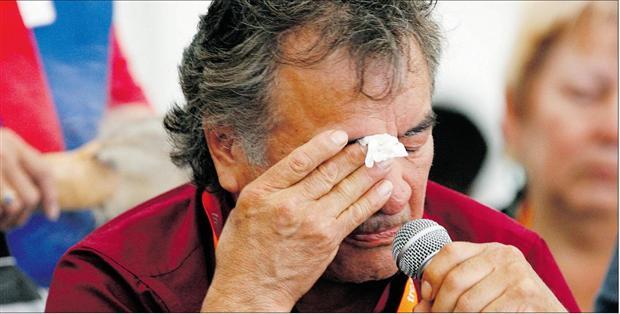Residential Schools: the Full Story
The Leader-Post
The tragic history of Canada's 130-year Indian residential school system has generated so many public inquiries, commissions, articles, books and radio and TV documentaries some might think there's nothing else to be learned. They'd be wrong. Take Justice Murray Sinclair, the distinguished Manitoba judge who chairs what will perhaps become the definitive investigation into the residential school experience - the Truth and Reconciliation Commission of Canada. Asked if he's learned anything new from more than two years of hearings, survivor statements and documentary evidence, Sinclair doesn't hesitate: "The number of children that died in residential schools shocks me." Sinclair says it's believed "tens of thousands" of aboriginal children died from tuberculosis, influenza, neglect and abuse. Compounding the tragedy is the fact many families were never told where their children's bodies were buried. Other children in the "last stages of tuberculosis" were sent home to their families to die, Sinclair said. It was a deliberate practice that decreased the mortality rate at the schools while callously increasing the risk of transmission to families. Sinclair, who has been in Regina for three days of hearings that wrap up today, says many survivors remained silent for years - including members of his own family. For example, Sinclair only learned of his own father's sexual and physical abuse at a residential school after he died. "He never talked about it," said Sinclair, who did not attend a residential school himself. Though Sinclair and fellow commissioners Marie Wilson and Chief Wilton Littlechild have heard some desperately sad stories from across the country, Sinclair says the record will reflect the fact that some residential school students had positive experiences in schools where there was no abuse of any kind. They forged lifelong friendships with other children and had good teachers. Still, the system as a whole was a profoundly negative influence on seven generations of aboriginal people, Sinclair says. Thousands of children forcibly taken from their families spent their formative years institutionalized and many emerged as dysfunctional adults. The resulting damage is still felt today. The commission was created as part of the Indian Residential Schools Settlement Agreement that has seen $1.9 billion in compensation paid to survivors. As well as holding hearings it organizes "national awareness events" to inform and educate Canadians on residential schools - the next is in Saskatoon from June 21-24. By the time the commission wraps its fiveyear mandate in 2014, it will have gathered thousands of survivor stories and official documents from government and church sources. That record will be housed in a new national research centre - what Sinclair calls "a national memory . . . so that in four or five generations, no one can say 'this never happened'". It pains us to say it, but too many nonaboriginal Canadians are either ignorant of the past - or in outright denial. They look at the sad economic and social plight of many aboriginal people today and wonder why they just can't "pull themselves together". The answer lies in the past. We owe it to those who died in residential schools and those who survived to learn the facts so the nation truly can heal its relationship with aboriginal people - and achieve the commission's goal of a new understanding based on "mutual respect".
|
.
Any original material on these pages is copyright © BishopAccountability.org 2004. Reproduce freely with attribution.
